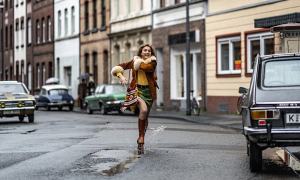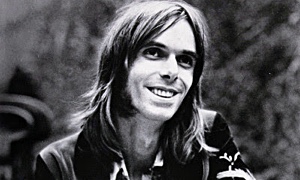Home » Jazz Articles » Film Review » Mulatu Astatke: February 1, 2009
Mulatu Astatke: February 1, 2009
 Mulatu Astatke
Mulatu AstatkeFebruary 1, 2009
Mochilla
2010
For the first 40 years of his professional life, composer and vibraphonist Mulatu Astatke, the father of Ethio-jazz, remained practically unknown outside his own country. That changed in 2005, when his atmosphere-laden recordings were featured extensively on the soundtrack to the Jim Jarmusch-directed movie Broken Flowers. Since then, Astatke (sometimes spelt Astatqe), born in 1943, has become a celebrity in jazz and world music circles, and has even taken to performing internationally. If ever a musician has deserved his overdue period in the spotlight, it is this singular genius.
In Europe, Astatke frequently performs with the London-based Heliocentrics and also with the Massachusetts-based Either/Orchestra, reprising his classic recordings and introducing new material. He is also increasingly engaged as the front man for one-off appearances with locally recruited orchestras, such as the one seen and heard on February 1, 2009, which was filmed at the Harriet and Charles Luckman Fine Arts Complex in Los Angeles.
With these projects, Astatke is credited as composer and arranger, while a second, local arranger puts the band together and makes any additional arrangements required because of variations in instrumentation. Astatke arrives at the location a day or two prior to the performance, to rehearse with the band and fine-tune the arrangements. It's a relatively economical way of presenting Astatke's work with the 14- or 15-piece lineup necessary to do it justice.
The excellent Los Angeles orchestra heard on February 1, 2009 was put together by trombonist Joel Yennior, and includes three legends of American jazz in trombonist Phil Ranelin and reed players Bennie Maupin and Azar Lawrence. All three are featured soloists, along with trumpeter Todd Simon, violist Miguel Atwood-Ferguson, keyboardist Brandon Coleman and Yennior himself. There's a rock solid, funktastic rhythm section—electric guitarist Dan Ubick, electric and acoustic bassist Trevor Ware and drummer Tony Austin—augmented by percussionists Alan Lightner and Munyungo Jackson. Bands don't come much better than this, either as an ensemble or as a collection of soloists.
The sound quality is superb and the film—stylishly shot in black and white (what is it with monochrome photography that so often makes it more effective than full color?)—is unfussy and consistently on the music. The majority of the nine tunes were first recorded by Astatke in the early 1970s, and most will be familiar to anyone who has seen Broken Flowers or knows the Astatke compilation Ethiopiques 4: Ethio Jazz & Musique Instrumentale 1969-1974 (Buda Musique). More recent compositions include the breathtakingly pretty "The Radcliffe," a showcase for Atwood-Ferguson's viola and Simon's flugelhorn, which is named after the Boston college where Astatke completed a Fellowship in 2008. Footage of another four tunes, not included in the main film, is included as an extra, with a perfectly decent board mix.
February 1, 2009 is near perfect in every respect. The only quibble, and it's micro, is the use of black and white for the slideshow of people and places in Ethiopia. Somehow, unlike the concert film itself, the photos are diminished rather than enhanced in monochrome.
The DVD is released by Mochilla as part of a three-disc box, Timeless. The other discs include Arthur Verocai's March 15, 2009, reviewed here.
Tracks: Yekermo Sew; The Radcliffe; I Faram Gami; Yekatit; Kasalefkut Hulu; Mulatu; Munaye; Yegelle Tezeta; Ebo Lala.
Personnel: Mulatu Astatke: vibraphone, percussion; Todd Simon: trumpet, flugelhorn; Phil Ranelin: trombone; Joel Yennior: trombone; Bennie Maupin: soprano saxophone, flute, bass clarinet; Azar Lawrence: tenor saxophone; Miguel Atwood-Ferguson: viola; Brandon Coleman: electric piano, acoustic piano, organ; Dan Ubick: electric guitar; Trevor Ware: electric bass, acoustic bass; Tony Austin: drums; Alan Lightner: percussion; Munyungo Jackson: percussion.
Production notes: 73 minutes; black & white. Extras: downloadable audio; special features; slideshows.
Tags
Mulatu Astatke
DVD/Film Reviews
Chris May
United States
Either/Orchestra
Phil Ranelin
BENNIE MAUPIN
Azar Lawrence
PREVIOUS / NEXT
Support All About Jazz
 All About Jazz has been a pillar of jazz since 1995, championing it as an art form and, more importantly, supporting the musicians who make it. Our enduring commitment has made "AAJ" one of the most culturally important websites of its kind, read by hundreds of thousands of fans, musicians and industry figures every month.
All About Jazz has been a pillar of jazz since 1995, championing it as an art form and, more importantly, supporting the musicians who make it. Our enduring commitment has made "AAJ" one of the most culturally important websites of its kind, read by hundreds of thousands of fans, musicians and industry figures every month.

























